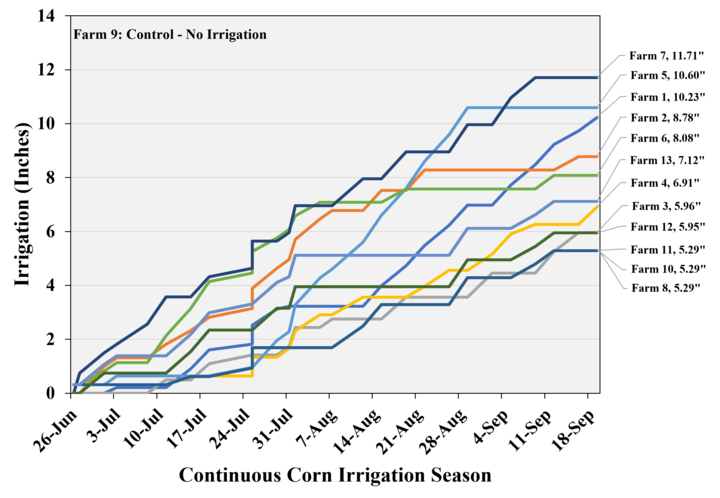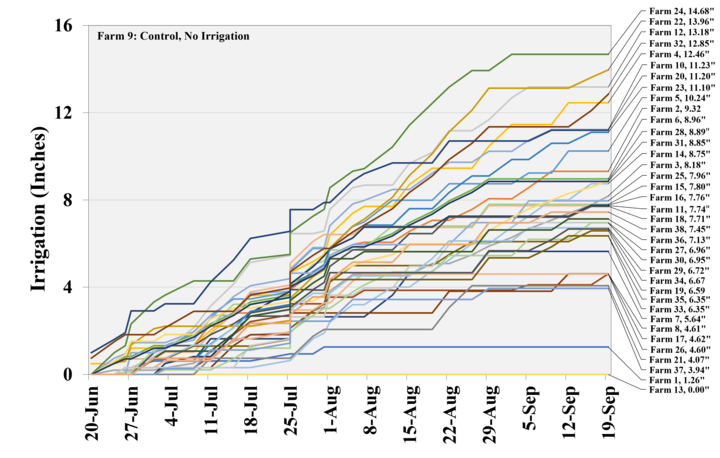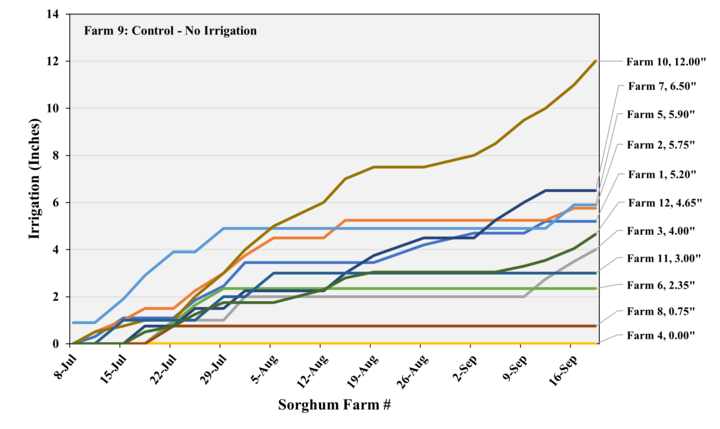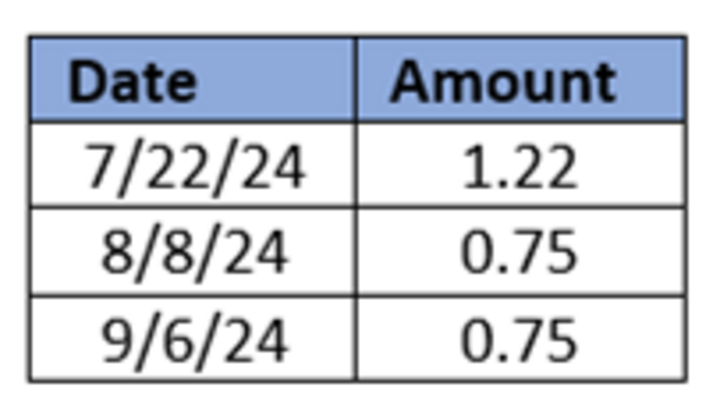The 2024 UNL-TAPS irrigation season saw participants navigating a range of weather conditions across Nebraska, with irrigation decisions playing a key role in the competitions. At the North Platte location, 13.02 inches of rainfall were recorded, slightly below the seven-year average of 14.75 inches. Participants in the corn competitions, both continuous and sprinkler, faced a typical season, with varying irrigation strategies from mid-June to mid-September. Meanwhile, the sorghum competition, hosted in Grant, Nebraska, introduced new challenges as participants managed irrigation alongside nearly nine inches of rainfall, as well as a hail event. In Mead, the soybean competition experienced unseasonably high rainfall, minimizing irrigation needs. As the TAPS program approaches its conclusion, these irrigation decisions will be critical in determining the 2024 winners, set to be announced at the Awards Banquet in January.
North Platte, Nebraska
According to the rainfall gauge supplied by EarthScout, located at the edge of the competition pivot in North Platte, 13.02 inches of rainfall were recorded from May 1 to Sept. 30, 2024. Over the past seven years, the competition has averaged 14.75 inches during that same period. The driest years were 2020 and 2022, with just 8.95 inches, while the wettest year was 2019, with 21.2 inches of rainfall at the TAPS location.
For the 2024 TAPS irrigation season in the corn competitions, conditions were fairly typical compared to previous years. Participants could irrigate between June 17 and September 19. Below is a summary of the irrigation decisions made by participants in the corn competitions at North Platte.
Continuous Corn
Although the irrigation season opened on June 17, the first irrigation decision in the continuous corn competition was not submitted until June 27, by Farm 7. From that point, at least one of the 13 competing teams irrigated during each available opportunity until the irrigation season concluded on Sept. 19. Three irrigation opportunities were canceled due to rainfall — two in July and one in August. Excluding the control (Farm 9), the total irrigation applied among continuous corn teams ranged from 5.29 inches (Farm 8) to 11.71 inches (Farm 7), with an average of 7.60 inches.

Sprinkler Corn
Irrigation in the sprinkler corn competition began on June 20, initiated by three teams, and continued through every available irrigation opportunity until Sept. 19. Rainfall led to the cancellation of three irrigation opportunities: twice in July and once in August. Apart from the control (Farm 9), irrigation totals among teams ranged from 0.00 inches (Farm 13) to 14.68 inches (Farm 24), with an average of 7.84 inches.

Grant, Nebraska
Sorghum
In 2024, sorghum participants made irrigation decisions for the first time, following the competition’s move to Grant, Nebraska. The RealmFive weather station at the Henry J. Stumpf International Wheat Center recorded 8.96 inches of rainfall from installation on June 7 through Sept. 30. The field also received hail on Aug. 7 that may have impacted participants' irrigation scheduling for the remainder of the season. The irrigation season began on June 24, with the first irrigation decisions made for July 1. However, over an inch of rainfall led to the cancellation of that irrigation, and the first irrigation application occurred on July 8 (Farm 5). A rainfall event also canceled the Aug. 22 irrigation. Otherwise, the pivot ran 19 times throughout the season, concluding on Sept. 19, with three teams irrigating on the final day. Excluding the control (Farm 9), total irrigation among sorghum teams ranged from 0.0 inches (Farm 4) to 12.00 inches (Farm 10), with an average of 4.8 inches.

Mead, Nebraska
Soybeans
In the inaugural year of the soybean competition at the Eastern Nebraska Research, Extension and Education Center, participants did not make their own irrigation decisions. All 18 soybean farms received the same amount of irrigation throughout the season. Due to an unseasonably high rainfall total of 24.02 inches from planting on April 24 to Sept. 30, irrigation requirements were minimal, with just 2.72 inches applied over three dates:

The irrigation decisions made by participants will be crucial as the 2024 TAPS program draws to a close and winners are determined. The final results and awards will be presented at the annual Awards Banquet, scheduled for Saturday, Jan. 25 in Kearney, Nebraska.
